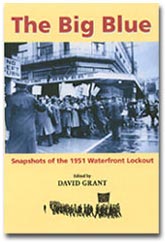At its peak, the lockout and its associated strikes affected 22,000 workers in a population of one million people. It had a major impact on the history of trade unions and the progressive left in New Zealand. Divisions surrounding the dispute polarised the union movement and left a bitterness that still exists.
In February 2001 the Trade Union History Project ran a seminar in Wellington to commemorate the fiftieth anniversary of the lockout. This anthology is the end result of that event. It presents 1951 from a range of insights and approaches not previously explored. These include the experience of women and the families of waterside workers, the clandestine activities of the dissenters, the perspective of union leaders who took part in the lockout as young men, and that of government officials and one major political figure. These accounts highlight the propinquity and emotion that came with first-hand experience of the conflict.
Contributors include 1951 lockout veterans Ted Thompson, Bill Andersen and Bill ‘Pincher’ Martin, activists Rona Bailey and Dick Scott, playwright Renée, trade union leaders Ken Douglas, Chris Kenny and John Whiting, prominent public servant Noel Woods, oral historian Judith Fyfe, veteran Australian unionists Alwyn Allport, Alistair Couper and Harry Black, diplomat Hon. Sandra Lee, historians Bruce Brown, Anna Green, Melanie Nolan, Jock Phillips, Pat Walsh and Redmer Yska, cartoonists Max Bollinger and Len Gale, poet Bill Sewell and several anonymous poets of the time.
David Grant is a Wellington historian. This is his eighth book. His last major publication was Those Who Can Teach: A History of Secondary Education in New Zealand from the Union Perspective (Wellington 2003) and he is currently researching a history of the New Zealand Seafarers’ Union. He joined the TUHP committee in 1997 and became chairperson in 2002.

